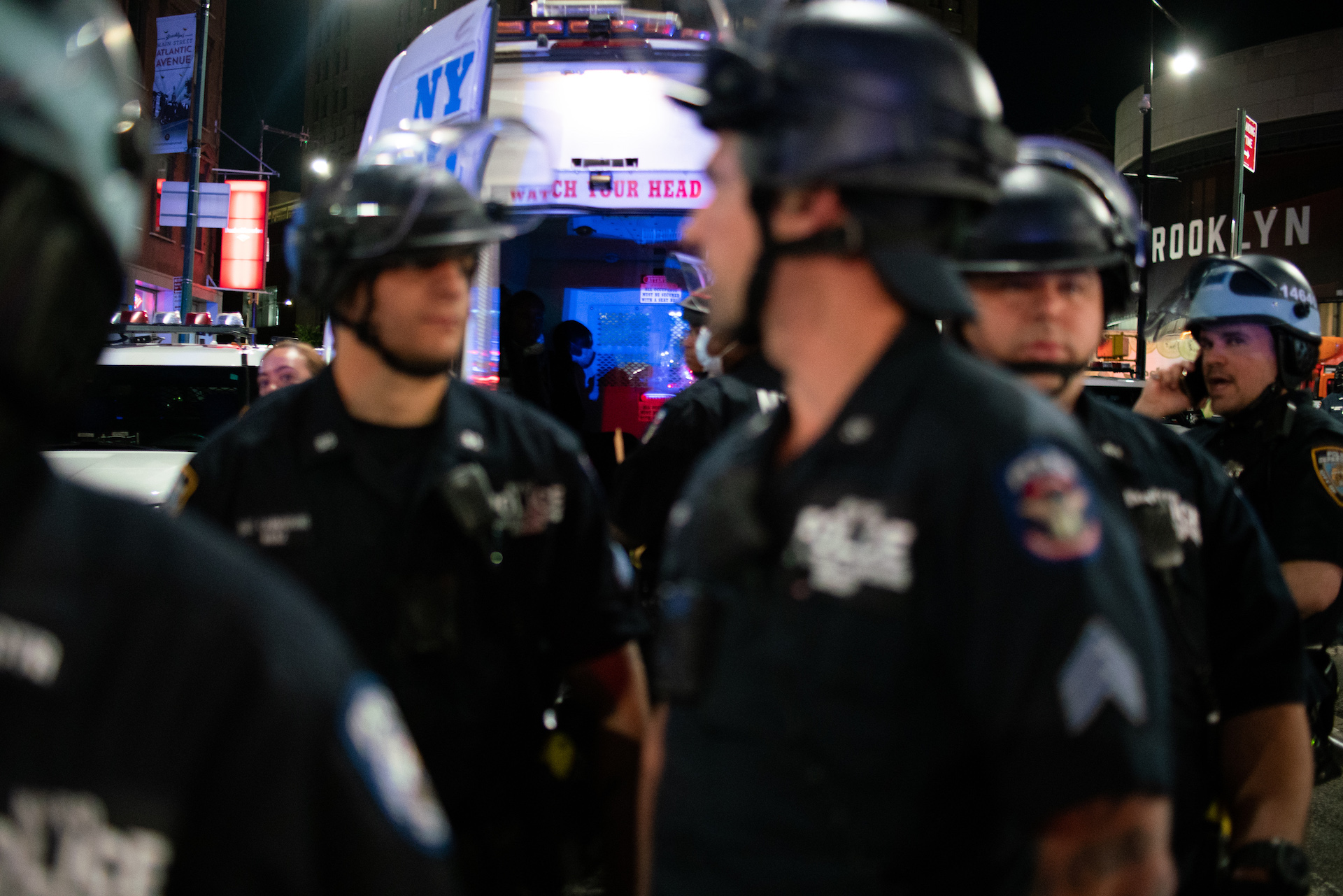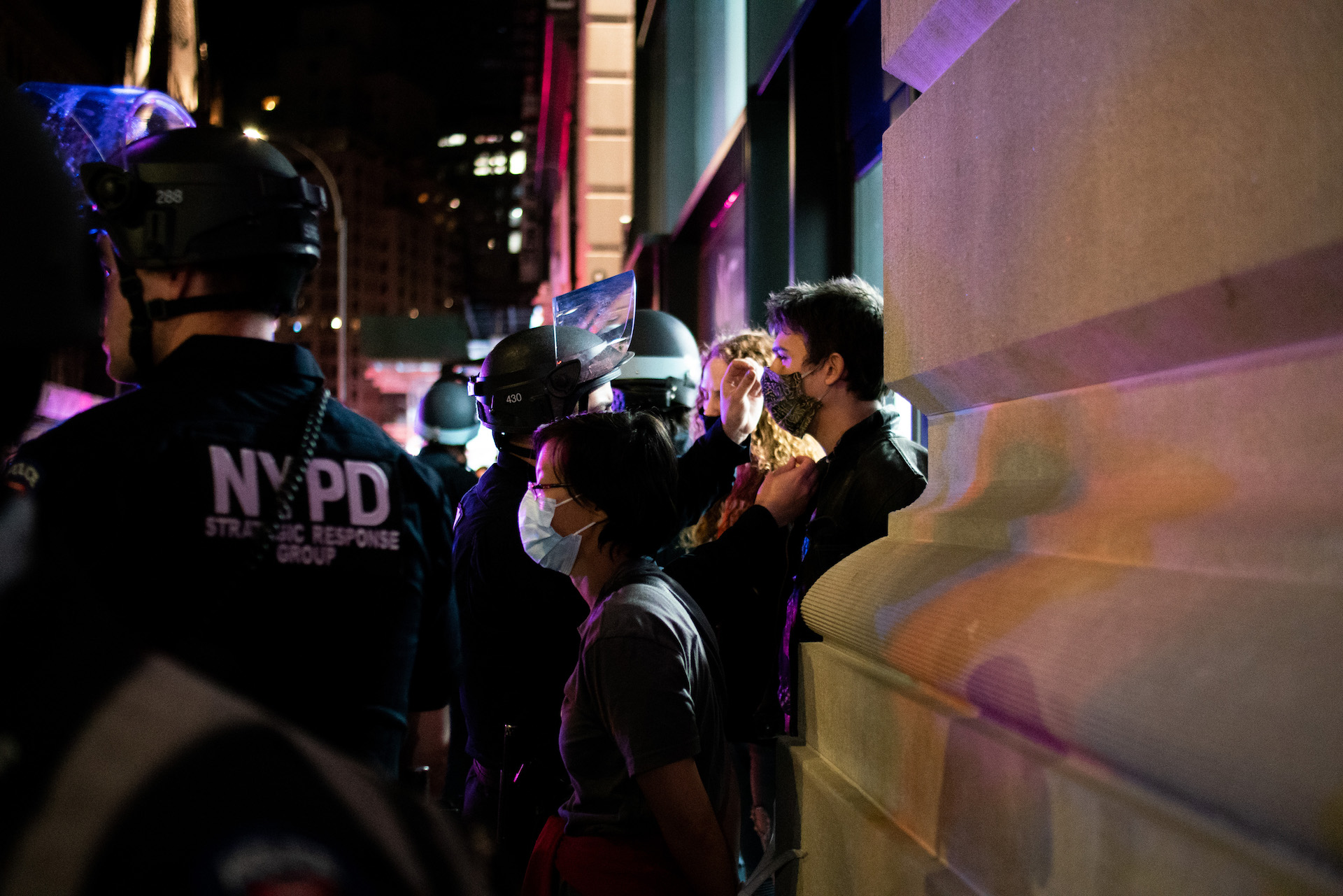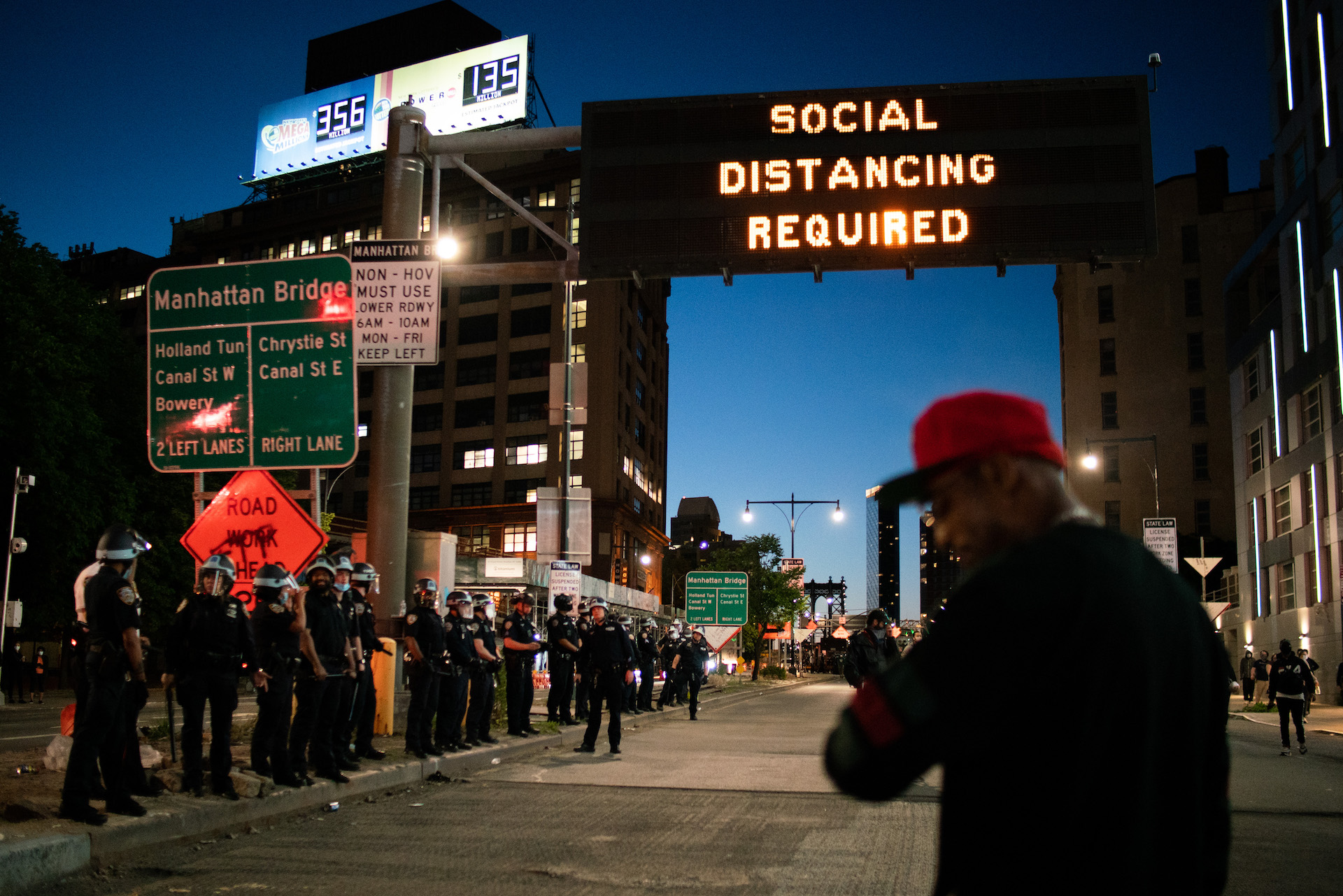“Do the right thing.”
That’s what 30-year-old musician Nikko Sherard shouted at a New York City police officer before he was arrested at a protest Saturday night in Lower Manhattan.
The cop was arresting another protester, 26-year-old Hudson Sackrider-De Ricco, when Sherard spoke up. Then he was tackled and surrounded by men in uniform.
“They had got me down on the ground — I was screaming, ‘I’m a black man! Please somebody film this,’” Sherard said. “All I remember was getting punched, and just seeing a group of white people with blue eyes and blue uniform[s] just wailing on me.”
As terrifying as that was, what happened next was even scarier. Sherard, Sackrider-De Ricco, and more than a dozen other protesters were thrown in a bus and transported a few blocks away to One Police Plaza, the NYPD’s headquarters, where they were subject to long hours of detention in crowded confines that seemed to inevitably expose detainees to the deadly coronavirus.
“People were screaming, ‘Please give us our masks!’” said Sherard. “They just packed us in there like sardines. There was one person who was turning red and throwing up and sweating. Someone was yelling that he had the coronavirus and they have us in here without masks on.”
Sherard said he had worn a medical mask to the protest, though by the time he was arrested, it was broken. He’d tied a scarf around his nose and mouth instead, but it was ripped off during the skirmish with police. An EMT later gave the scarf back to Sherard, but when he was taken to a holding cell, the police confiscated it, along with his shoelaces.
Arrested demonstrators, lawyers, and the activists who take care of released protesters told VICE News that protesters have been unable to stay six feet apart from one another in cramped holding pens and cells of police facilities, including One Police Plaza. No one reported being given a mask or any personal protective gear while in custody, and many said the police themselves rarely wore masks. Water was scarce.
“I don’t know that the NYPD is purposefully trying to give protesters the coronavirus, but I think it makes it that much more urgent to try to get people through the system,” said Rebecca Heinsen, a staff attorney at the Legal Aid Society who works in Manhattan. “Or, I mean, they should be not making these arrests.”

The Centers for Disease Control guidelines say that the most effective way to protect individuals and rapid spread of the virus is to stay six feet apart, wear a face covering, wash hands with soap and water or, if that’s not available, use hand sanitizer, and disinfect surfaces regularly.
Practices abandoned
“It’s shocking for the city on the one hand to be saying, ‘Engage in all of these practices,’ and then to say, ‘In the hours that you’re in our custody, and you don’t have any control over how far away you are from other people or whether you have masks or whether you can wash your hands, we’re simply not going to let you do those things,’” said Gideon Orion Oliver, a volunteer attorney with the New York City chapter of the National Lawyers Guild.
More than 2,000 people had been arrested at protests across New York City’s five boroughs as of Wednesday night. The city was the epicenter of the U.S. coronavirus pandemic, and to date it has had more than 301,000 confirmed cases and 21,000 deaths.
In New York City, and across the country, the pandemic has disproportionately hurt brown and black communities — black and Latino New Yorkers are more than twice as likely to die from COVID-19 than white residents are. These are the same communities where many people have lost their jobs as a result of the shutdowns. According to a Pew Research survey, at least 61% of Hispanic Americans, and 44 percent of black Americans have lost their jobs as a result of the coronavirus.
Now, as civil unrest over the police killing of George Floyd continues, communities of color are being forced into weighing the possibility of contracting and perhaps spreading the virus, and protesting police violence.

“This is the sheer injustice that black people are having to go out in the street to protest our deaths — and we’re being exposed to this virus,” said Carlos Polanco, a 21-year-old Dartmouth College student. “This works out for the police well: They either get to brutalize us and kill us on the street, or we are close to people and our chances for COVID are high.”
Fear of another spike
Legal advocates fear that the police’s attitude toward public health may cause another spike in cases. That could mean that the death toll will start creeping up again, especially in already devastated communities, just as the city begins its phased reopening plan.
The Legal Aid Society filed an emergency lawsuit against the NYPD on Tuesday, accusing the department of detaining more than 100 protesters for more than 24 hours. That’s illegal under New York law, which stipulates that people must be arraigned less than 24 hours after their arrest.
On Thursday, however, a Manhattan judge denied the group’s request. Judge James Burke ruled that the delayed detention was acceptable. New York City, he said, has found itself in “a civil unrest crisis within the overarching COVID-19 crisis.”
During the hearing, a representative for the NYPD said that the officers acknowledged that social distancing for arrested protesters isn’t necessarily possible.
“These protesters, while they are out on the street, are not social distancing either,” Assistant Deputy Commissioner Janine Gilbert said.
Heinsen handled six arraignments on Tuesday, all for people who had been arrested and charged with low-level felonies in connection to the protests, such as third-degree burglary. Law enforcement has the discretion to release protesters with an order to return to court at a later date, but instead, many protesters have remained locked up. (Gilbert said officers don’t have time to write these types of tickets in the street.)
One of Heinsen’s clients had been in custody for more than 50 hours, while others had been in custody for more than 45. None were able to socially distance. She spoke with a man who had asthma and had kept his mask on; another had gone to a protest wearing a mask but had it confiscated by the cops as part of his “property.”
“Everybody that I represented — I don’t think it was a surprise that they were all black and brown people,” Heinsen said. “The majority of the people I saw had no warrant, no criminal history, and they’re being charged for these felonies for what seems like very flimsy allegations.”
In a statement Thursday, the Legal Aid Society condemned Burke’s decision, saying it went against established precedent.
“The NYPD is fully responsible for the hundreds of New Yorkers who are currently languishing in cages, deprived of their due process rights and at an increased risk of contracting COVID-19,” the group said.

Normally, arraignments will go until 1 a.m. at 100 Centre Street, home of the New York City Criminal Court. On Wednesday night, when approximately 170 more people were arrested across the city, arraignments continued all night. Even people who are not being arraigned but are simply being given a ticket to appear in court months from now may now be held in custody for as long as 10 to 15 hours, according to Elena Cohen, president of the National Lawyers Guild, which is providing legal support to protesters.
‘We were begging them to give us masks’
“The point of police is to help public health and safety, so arresting [protesters] and holding them is obviously not doing that,” Cohen said. Of the arrested protesters she’s interacted with, she said no one was offered hand sanitizer and given a chance to wash their hands. She’s been unable to find a single person who was asked about whether they have the coronavirus. “It feels like the NYPD has completely forgot that coronavirus is happening. There’s no indication that they’re aware of it.”
Julian Shapiro-Barnum, a 20-year-old acting student arrested alongside Sherard on Saturday, waited for about three hours on the bus crowded with other arrestees before being taken to One Police Plaza.
Once they arrived, he was shepherded into a packed room. Shapiro-Barnum as well as two others who were arrested at the same time say that only a minority of people, including arrestees and cops, were wearing masks.
“We were begging for them to give us masks and they were just laughing at us,” recalled Jack B., a 25-year-old freelance filmmaker who asked that his last name not be published.
“Everyone was losing their mind,” Shapiro-Barnum said. “Some people had been there for 12 hours at that point and they hadn’t been seen.”
VICE News provided the NYPD with a detailed list of questions about protesters and lawyers’ allegations.
In an emailed response, spokesperson Sgt. Jessica McRorie replied only, “We are working as fast and safely as we can to process arrests during this unprecedented time.”
Twenty-year-old protester V.M., who asked that VICE News use only her initials, was arrested Saturday night in Manhattan. She ended up at One Police Plaza for 10 to 12 hours, before she was given instructions to appear in court. During that time, she said that she was given just one cup of water to share between two other people.
“These protests have been going on for a week,” said Akin Akinjiola, a Legal Aid Society staff attorney who works in Manhattan. “[Police] have the numbers of how many people they’re going to arrest so they could be prepared: If you have tickets, if you have handcuffs for them, then have a mask, have a glove.”
Cover: NYPD officers make a mass arrest in lower Manhattan, most with no masks on to protect themselves or the arrestees from COVID-19. (Photo: Joe Hill, VICE News)
from VICE https://ift.tt/2A5ghzN
via cheap web hosting
No comments:
Post a Comment